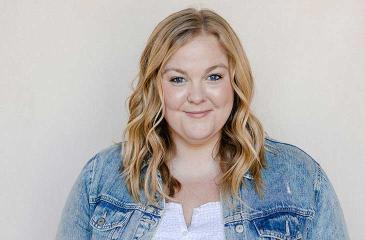The Synapse: July 2022
Building Systems to Support Integration of Research and Clinical Care
Allison Hudson has served as the Clinic Manager for the MIDB Clinic since the building opened in November 2021 and previously served as the Clinic Manager of the M Health Fairview Voyageur Clinic. Allison recently began a new role in which half of her time will continue to be devoted to management of the MIDB Clinic, with the other half devoted to the integration of research and clinical care at the MIDB. Please see the following note from Allison regarding her new role:
I’m delighted to serve in my new role helping the researchers and clinicians at MIDB build systems, expectations, supports, and collaborations that support the integration of research and clinical care. Some of these systems will be around how we gather and document information within clinic, and some of these systems will be how we make communication and collaboration easier.
In my role, my first priority is to hear from the people doing the work. Over the summer, MIDB will hold focus groups to hear directly from researchers, clinicians, and other key stakeholders about what is currently happening, what is going well, where we have gaps and opportunities, and ultimately learn more about the ideal state. We’ll use the feedback from these focus groups to create a clear action plan that prioritizes projects and tasks for the next six to 12 months.
One priority area will be to ensure clinical services—such as labs or other nursing care activities—are easily available for research staff. Within MIDB, the proximity of clinical care and research space is incredibly unique. It allows for collaborations to develop in a natural way, while providing a seamless experience for patients.
If we can capitalize on this collaboration, there are massive impacts for researchers, patients, and the care we provide in general. For researchers it could mean easier recruitment, and for patients it means an easier opportunity to help push forward the science that will hopefully impact care and outcomes.
While I have extensive experience in clinical operations and building systems to support those operations, research is newer to me. I’m excited to learn more and bring a fresh set of eyes to this work, and to listen, learn, and talk to the people who are the experts.
I look forward to working with colleagues across the MIDB to identify challenges, and to help develop and execute potential solutions.
Thank you,
Allison Hudson
MIDB Clinic Manager
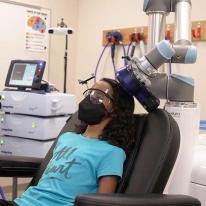
Name the Robot Contest
Help MIDB names its new TMS Robot, which is one of only a handful in the U.S. and 1 of 40 in the world. Transcranial magnetic stimulation (TMS) is a painless, non-invasive technique used to stimulate the brain. MIDB researchers are evaluating the use of TMS as a new treatment for children and teens with conditions like Tourette syndrome, OCD, depression, autism, and attention-deficit/hyperactivity disorder. Submit your robot name idea.

Creativity Camp Aims to Advance New Interventions for Adolescent Mental Health
In June, a multidisciplinary team from across the U—from psychiatry, to arts, to biostatistics—held the first of three Creativity Camps for adolescents. Held at MIDB and the Weisman Art Museum, each two-week camp is designed to help young people with depression shift out of negative thought patterns through engagement in creative activities. Using MIDB's state-of-the-art neuroimaging services, the researchers look at participants’ brains before and after camp to understand how creative interventions might impact cognitive flexibility and changes in their condition. “I’m all about finding more options to try to help kids,” said Kathryn Cullen, MD, the project’s principal investigator. “I also think it will help us learn about the neuroscience of creativity, and hopefully, we’ll be able to come up with a brain scan that can really capture the creative moment.” Learn more about the study.
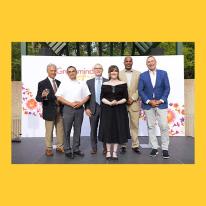
Great Minds Get-Together
On June 21, more than 100 invited guests attended the Great Minds Get-Together at MIDB. Hosted by the University of Minnesota Foundation, the event culminated with leaders from MIDB, the University and M Health Fairview along with donors and other supporters to celebrate the institute's opening and its impact on the community. Read more about the event.

Researchers Discover Solutions to Gender Bias in Autism Diagnoses
Published in Biological Psychiatry, a multidisciplinary study led by the University of Minnesota demonstrated that an equal number of girls and boys can be identified as having concerns for autism spectrum disorder (ASD) when screened earlier, correcting large gender differences in current diagnoses. “Conventional wisdom has been that more boys than girls have ASD,” said study lead author Casey Burrows, PhD, LP, an assistant professor of pediatrics. “Our research shows that girls and boys show similar rates of concerns for ASD and identifies some of the biases contributing to the inflated sex ratios. We hope this research will bring relief to women and girls who have struggled socially without knowing why.” Learn more about the study.

Finding Myself in Color, July 7–Sept. 9 at MIDB
ICI celebrates disability pride, along with pride in other identities, with an exhibit of visual artist Avery Hunter’s Finding Myself in Color at MIDB's Brenden-Mann Community Center. It is the first solo show for Hunter, a transgender man living with developmental, psychological, and physical disabilities. His acrylic on canvas works include abstracts and self-portraits. Hunter will discuss his art and identity pride at 4 p.m. on July 7 at Brenden-Mann. An opening reception will follow from 5 p.m. to 7 p.m. The event and parking are free and open to the public. Learn more about the artist and the exhibit.
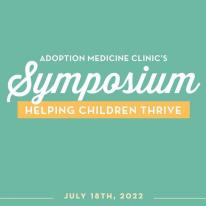
Adoption Medicine Clinic Symposium: Helping Children Thrive
Join us at the second annual AMC Symposium which takes a multidisciplinary approach to assessing and caring for children who have been adopted internationally, domestically, or are in foster/kinship care. Held on Monday, July 18, 9 a.m. to 2:30 p.m. (virtual or in person at Huntington Bank Stadium), this educational conference is for social workers, physicians, psychologists, behavioral therapists, occupational therapists and families to learn about AMC research, practices and advocacy. Through focused and collaborative sessions, attendees will learn about the power of the AMC’s interdisciplinary team approach through a series of lectures, case studies and discussions. CE credits are available. Register today.
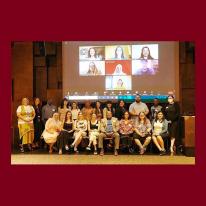
Meet the LEND Class of 2022
From developing more inclusive 4-H programs to identifying best practices in teaching medical and dental students about intellectual and developmental disabilities, the Institute on Community Integration’s 33 Minnesota Leadership Education in Neurodevelopmental and Related Disabilities (MNLEND) program fellows made significant contributions to the field. ICI celebrated their accomplishments in May. Read more about the MNLEND graduation.
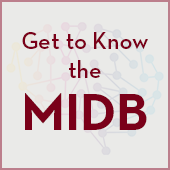
MIDB Colloquium Videos Now Available
Have you missed one of the recently held Get-to-Know-the-MIDB meetings? Watch the meeting videos online and hear from MIDB leaders and learn more about core research services, clinic structure, and community engagement partners to the University community. Also, save the dates for upcoming presentations and plan to join us in-person.
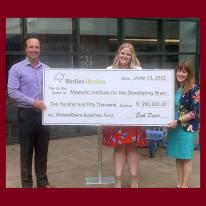
Minnesota Non-Profit Supports MIDB Through Superhero Fund and More
On June 13, Birdies4Brains, a Minnesota nonprofit dedicated to helping brain injury survivors experiencing financial hardship, presented a $250,000 check to celebrate its partnership with MIDB and the establishment of the Birdies4Brains Superhero Fund. Last year Birdies4Brains became the first community nonprofit organization to establish a fund to provide financial assistance, resources, and programming to MIDB patients and their families. To further its commitment to MIDB, Birdies4Brains donated plush birdie toys and copies of the children’s book, A Spectacular Birdie, written by local author Sarah Warren, which are distributed to patients and families visiting MIDB.
